The Diplomat
The Minister of Foreign Affairs, José Manuel Albares, began yesterday in Belgrade a tour of four Balkan countries to express Spain’s support for their European accession and to present the general lines of the upcoming Spanish Presidency of the EU Council with regard to the region.
Albares was received yesterday in Belgrade by the Prime Minister of Serbia, Ana Brnabic, on her first official visit to this country. During the meeting, as reported by the Serbian Government, the minister and the head of the Executive agreed that the political relations between the two countries are “excellent, are based on solid foundations and represent a strong support for further strengthening of cooperation in other areas, with special emphasis on economy and trade”. For his part, Albares stated that the friendship between the two countries is strong and that political relations are excellent and assured that Spain will play an important role during its Presidency in favor of the EU enlargement policy.
Ana Brnabic also thanked Spain for its “principled attitude of respecting the territorial integrity and sovereignty of Serbia” and its support for the integration of her country into the EU and informed Albares about the process of dialogue between Belgrade and Pristina. In this regard, she deplored “provocations on the ground, attacks and harassment against the Serbian population and desecration of cultural heritage” and denounced that “Pristina is not fulfilling its obligations under the Brussels Agreement”, the agreement adopted by Serbia and Kosovo in 2013 that launched negotiations between the two sides to normalize their relations.
As reported by the Ministry of Foreign Affairs in a press release, one of the objectives of this trip was precisely to learn on the ground about the evolution of the dialogue between Belgrade and Pristina and to show support for the work of the European Union Representative, Miroslav Lajçak, and the search for “a definitive and mutually acceptable solution to the conflict in the area.”
Kosovo unilaterally proclaimed its independence from Serbia on February 17, 2008, but the new state has not been recognized by Serbia or numerous countries, including Spain (as well as Greece, Cyprus, Slovakia and Romania within the EU). In 2011, Serbia’s leaders began negotiations for the normalization of relations with Kosovo, thanks to mediation from Brussels and in the context of Serbian aspirations to join the EU. However, the dialogue was completely blocked between 2018 and 2019.
Serbia is aware that the lack of an agreement with Kosovo harms its aspirations to join the European Union and is therefore trying to find a formula acceptable to it. For its part, Kosovo knows that without an agreement with Serbia it will not be able to approach the EU or join the UN. For these reasons, the two sides resumed dialogue in Brussels in July 2020. In June last year, the European Council urged “tangible progress” between Belgrade and Pristina “to facilitate the normalization of relations between Serbia and Kosovo.” A month later, Prime Minister Pedro Sanchez reiterated in Belgrade – after meeting with Serbian President Aleksandar Vučić – his support for the accession of Serbia and the Western Balkans as a whole to the European Union and assured that Spain “has been and will be on Serbia’s side” in relation to Kosovo.
Memorandum of Understanding
Later, Albares met with the Minister of European Integration, Tanja Miscevic, with whom he signed a Memorandum of Understanding (MoU) to strengthen collaboration in the process of European integration. The minister plans to sign such MoUs in all countries on this tour (Serbia, Bosnia and Herzegovina, Albania and North Macedonia). After the form, Miščević also stressed “excellent bilateral relations between the two countries” and thanked Spain for its “understanding of the importance of Serbia as a state negotiating accession and ready for it and beyond”.
After his trip to Belgrade, Albares will leave today for Sarajevo (Bosnia and Herzegovina) where, in addition to holding various institutional meetings, he plans to tour the city and visit the library rebuilt by the Spanish Cooperation. On Friday, the minister will travel to Tirana (Albania), where he will sign the same cooperation agreement with his colleague Olta Xhaçka, and will then move on to Skopje, where he will formalize another memorandum of understanding similar to that of the three previous countries with his counterpart, Bujar Osmani, and will hold various institutional meetings with authorities of North Macedonia.







